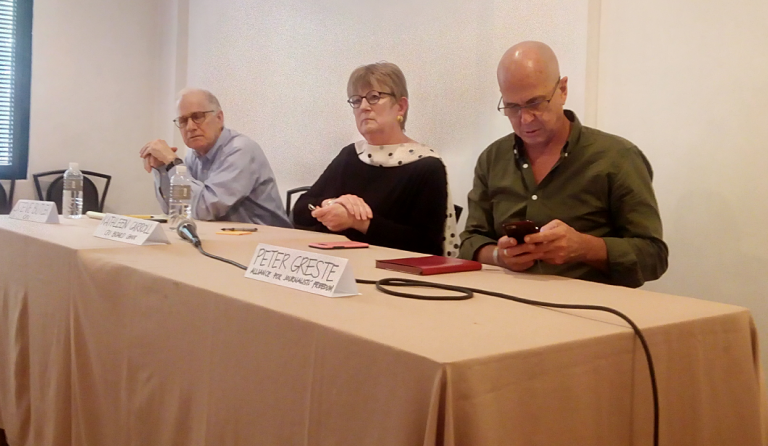
“This is a very great concern for the CPJ and the international community, because the Philippines has long enjoyed a very robust free press. We are concerned that not a lot is being done to protect your (Filipino journalists) ability to work without fear of retribution, prosecution, and attack.”
By ALYSSA MAE CLARIN
Bulatlat.com
MANILA — A high-level mission of the Committee to Protect Journalists (CPJ) raised alarm over the “shrinking space for free press in the Philippines” in a press conference, April 16.
CPJ believes that the attacks and threats critical media organizations are receiving are politically motivated.
The New York-based group cited the 11 legal cases filed against Rappler and the cyber attacks against small media outfits.
Leading the group is CPJ’s Board chair Kathleen Carroll, she’s joined by CPJ Asia Program Coordinator Steven Butler, and Alliance for Journalists’ Freedom director Peter Greste in meeting a wide range of journalists and government officials.
The group met with the presidential task force on media security, the secretary of the Department of Justice Mark Perete, as well as a wide group of journalists and media groups such as Bulatlat, Kodao Productions, AlterMidya, and the National Union of Journalists in the Philippines April 15 to get first-hand information about the situation of the media in the country.
“Government forces are finding new and increasingly sophisticated ways to shut down press freedom so the attacks on Rappler and others have a chilling effect across all journalists. That is profoundly damaging the country’s democracy,” Greste of ACF said.
“Our concern, not just about Rappler, but on the broader impact on the freedom of the press on the Philippines,” said Butler.
Carroll said that what concerns them most were two things: one; most journalistic killings have yet reached conviction, and second; the task force assigned for media concerns brush off the big issue of cyber-attacks against news organizations in the Philippines.
“Not taking the (cyberattacks) as an issue is a mistake, and we hope that they reconsider, ” she said.
Carroll also deemed the “red-tagging” of journalists and media people to be “very frightening.”
“This is a very great concern for the CPJ and the international community, because the Philippines has long enjoyed a very robust free press. We are concerned that not a lot is being done to protect your (Filipino journalists) ability to work without fear of retribution, prosecution, and attack,” said Carroll.
The group is set to publish its official mission report on it’s website after finalizing all the details.
The Philippines ranks fifth on CPJ’s Impunity Index, which measures the extent to which the killers of journalists escape punishment. The 2009 Maguindanao massacre, in which 32 of those killed were journalists, remains the worst single incident of journalist killing in CPJ records. Not a single conviction has yet been obtained for these murders.
The post CPJ finds ‘shrinking space for free press in PH’ appeared first on Bulatlat.
